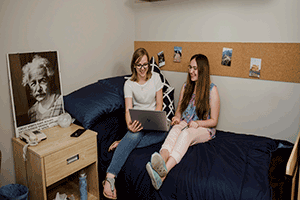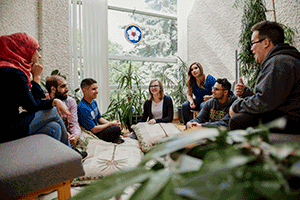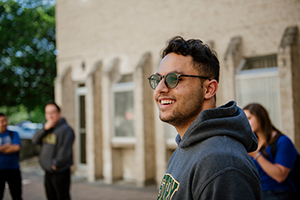Ready to learn more?
Get all the details straight to your inbox!

You can book a tour of Luther College, the U of R campus, and our student residence, The Student Village at Luther College, any time throughout the year. Contact our Recruitment Office at 1-306-206-2117.

Free enrolment counselling support and invaluable one-on-one academic advising are available for all programs at Luther College.

Our student residence, The Student Village at Luther College, welcomes residents from ALL post-secondary institutions in Regina. Rooms come with a meal plan, free laundry, free wi-fi, and a great sense of community.

Luther College appeals to students who want to study in a safe, nurturing, and inclusive environment. We welcome students of all faiths, ethnicities, backgrounds, religions, genders, and sexual orientations.

Luther College offers Bundles programs that group together first-year students and classes to give you a great start and help ease the transition from high school to university.

Eating better means studying better. The Luther Cafeteria offers fresh, healthy, nutritious meals seven days a week with a self-serve “all-you-care-to-eat” concept students prefer.

Luther College students are eligible for nearly $100,000 in academic awards – in addition to scholarships and bursaries awarded by the U of R.

Every degree program at Luther College offers a study abroad option and an optional experiential learning component where you gain real world experience and get paid while going to school!
Get all the details straight to your inbox!
If you would like to watch the recording of this Lecture, visit our YouTube channel.
Dr. Regan Shercliffe is the Chief of Staff Counseling at the United Nations World Food Programme in Rome. He worked as a Psychology professor at Luther between 2002 and 2010, at which point he took up a position with the UN. He's a clinical Psychologist with a specialization in PTSD. His work has taken him to many parts of the world, including Syria, Iraq, Myanmar, Afghanistan, Pakistan, China, Egypt, and Lebanon.
Humanitarian work is often portrayed as the virtuous selfless lone cowboy riding in to the middle of catastrophe to save the masses risking life, limb and psychological well-being all to serve a mandate. While there is some truth to this version, the reality is much more complex: there are endless contradictions, compromises, politics, passions and ego all set in the context of an organizational culture that is undergoing rapid transformation. There has been much discussion about the psychological impact of humanitarian work that focuses mostly on a broad definition of trauma. The psychological ramifications of doing this work aren’t completely tied to working in war zones; rather, mental health outcomes are a complex mix of personal motivations and organizational culture set against a backdrop of humanitarian crisis. Psychological risk associated with humanitarian work isn’t just about “trauma” - it’s about a breakdown in the relationship between the individual and the organization resulting from all the factors listed above.
The Luther Lecture was established by Luther College at the University of Regina in 1977 with the purpose of making a distinctive and stimulating contribution to the life of the University and the general community. Annually, a distinguished scholar or leader of note is invited to give a public talk on matters of spiritual and social importance.
The Luther Lecture is presented by Luther College with financial assistance from the James Kurtz Memorial Trust Fund.